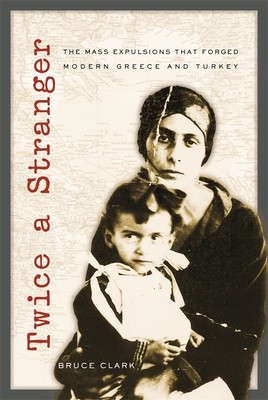
- We will send in 10–14 business days.
- Author: Bruce Clark
- Publisher: Harvard University Press
- ISBN-10: 0674032225
- ISBN-13: 9780674032224
- Format: 14.5 x 22.6 x 2 cm, softcover
- Language: English
- SAVE -10% with code: EXTRA
Reviews
Description
In the dismantling of the Ottoman Empire following World War I, nearly two million citizens in Turkey and Greece were expelled from homelands. The Lausanne treaty resulted in the deportation of Orthodox Christians from Turkey to Greece and of Muslims from Greece to Turkey. The transfer was hailed as a solution to the problem of minorities who could not coexist. Both governments saw the exchange as a chance to create societies of a single culture. The opinions and feelings of those uprooted from their native soil were never solicited.
In an evocative book, Bruce Clark draws on new archival research in Turkey and Greece as well as interviews with surviving participants to examine this unprecedented exercise in ethnic engineering. He examines how the exchange was negotiated and how people on both sides came to terms with new lands and identities.
Politically, the population exchange achieved its planners' goals, but the enormous human suffering left shattered legacies. It colored relations between Turkey and Greece, and has been invoked as a solution by advocates of ethnic separation from the Balkans to South Asia to the Middle East. This thoughtful book is a timely reminder of the effects of grand policy on ordinary people and of the difficulties for modern nations in contested regions where people still identify strongly with their ethnic or religious community.
EXTRA 10 % discount with code: EXTRA
The promotion ends in 19d.17:24:26
The discount code is valid when purchasing from 10 €. Discounts do not stack.
- Author: Bruce Clark
- Publisher: Harvard University Press
- ISBN-10: 0674032225
- ISBN-13: 9780674032224
- Format: 14.5 x 22.6 x 2 cm, softcover
- Language: English English
In the dismantling of the Ottoman Empire following World War I, nearly two million citizens in Turkey and Greece were expelled from homelands. The Lausanne treaty resulted in the deportation of Orthodox Christians from Turkey to Greece and of Muslims from Greece to Turkey. The transfer was hailed as a solution to the problem of minorities who could not coexist. Both governments saw the exchange as a chance to create societies of a single culture. The opinions and feelings of those uprooted from their native soil were never solicited.
In an evocative book, Bruce Clark draws on new archival research in Turkey and Greece as well as interviews with surviving participants to examine this unprecedented exercise in ethnic engineering. He examines how the exchange was negotiated and how people on both sides came to terms with new lands and identities.
Politically, the population exchange achieved its planners' goals, but the enormous human suffering left shattered legacies. It colored relations between Turkey and Greece, and has been invoked as a solution by advocates of ethnic separation from the Balkans to South Asia to the Middle East. This thoughtful book is a timely reminder of the effects of grand policy on ordinary people and of the difficulties for modern nations in contested regions where people still identify strongly with their ethnic or religious community.


Reviews